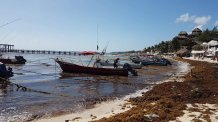May 12 2020
Scientists in the United Kingdom have designed an easy and affordable technique to produce fertilizers and biofuels from seaweed, while eliminating plastic from the oceans and cleaning up tourist beaches in Central America and the Caribbean.
 Sargassum seaweed in Playa del Carmen, Mexico in 2018. Image Credit: Rebecca Dowell.
Sargassum seaweed in Playa del Carmen, Mexico in 2018. Image Credit: Rebecca Dowell.
Each year, millions of tons of decaying seaweed get washed up on the beaches of the Caribbean, Mexico, and elsewhere.
The foul-smelling Sargassum seaweed is partially fed by fertilizers washed into the sea from farmlands in the Americas. The seaweed affects not just the tourism sector but also the fisheries and ocean ecosystems.
A group of researchers from the University of Exeter and the University of Bath has designed an affordable and easy method to pre-process seaweed before making biofuels and bulk chemicals from it.
Making Biofuels Financially Viable
Ultimately, for this to work it has to make financial sense. Processing marine biomass like seaweed usually requires removing it from the salt water, washing it in fresh water and drying it. The costs of these processes can be prohibitively high.
Mike Allen, Professor, University of Exeter and Plymouth Marine Laboratory
Allen continued, “We needed to find a process that would pay for and sustain itself—something both economically and environmentally viable. This work provides a crucial missing step towards a true salt-based Marine Biorefinery by establishing the initial fractionation step.”
The researchers used basic and acidic catalysts to develop a process that discharges sugars that can be utilized to feed a yeast that yields a substitute for palm oil. The same technique can also be used to create the residual seaweed for the subsequent stage of processing, known as hydrothermal liquefaction.
In this process, the organic material is subjected to high pressure and temperature, converting the seaweed into bio-oil that can be further processed into fuels, as well as affordable and high-quality fertilizer.
In contrast with existing pre-treatment strategies, we show that an entirely salt-based biochemical conversion route can work. For the first time this study demonstrates that, rather than a hindrance, the presence of saltwater can be helpful.
Ed Jones, Study First Author and PhD Student, Centre for Sustainable Circular Technologies, University of Bath
According to Professor Christopher Chuck, Director of the Centre for Integrated Bioprocessing Research at the University of Bath and the project lead, “The variety of products created by this process is a major strength. The oil industry creates a variety of products including liquid fuel, plastics and fertilizers—and we can benefit from a similar flexibility.”
We can simply alter the process conditions to produce larger or smaller amounts of specific by-products, allowing us to have meet variable demand.
Christopher Chuck, Director, Centre for Integrated Bioprocessing Research, University of Bath
Removing Ocean Plastics
Apart from using all the seaweed in products, any plastic gathered with the seaweed will also be converted alongside the seaweed. A part of the motivation for the project was from professor Allen’s children, Archie (9) and Rosie (12), who assisted in collecting seaweed samples for test studies from the Devon coast.
“It was Rosie who triggered a whole stream of research following the painstaking removal of plastic litter from the children’s seaweed samples by asking: ‘Dad, can't you just convert the plastics alongside the seaweed?” stated Professor Allen.
Removing an Environmental Nuisance
Another strength of the plan is the use of invasive seaweed like Sargassum—an environmental trouble that presently costs the tourist sector huge sums, both for clean-up charges and since it discourages visitors.
According to Allen, “Many countries in the Caribbean and Central America rely heavily on tourism, so the coronavirus pandemic and the ongoing Sargassum problem have put them on their knees. Last month more than 4 million tons of problematic seaweed washed up on their shores.”
This process is the most recent one in a line of progress around seaweed processing from the team, which is supported by UKRI, Roddenberry Foundation, Global Challenges Research Fund, Newton Fund, and Innovate UK.
Leveraging their diverse expertise in ecology, chemistry, biotechnology, phycology, and chemical engineering, the researchers are currently trying to design seaweed-based biorefineries to offer local solutions and opportunities on the international scale.
Starting with just a curious family on their local Devon beach, the concepts and ideas that the researchers have inspired are currently being applied on the global stage.
Journal Reference:
Jones, E. S., et al (2020) Saltwater based fractionation and valorisation of macroalgae. Journal of Chemical Technology and Biotechnology. doi.org/10.1002/jctb.6443.